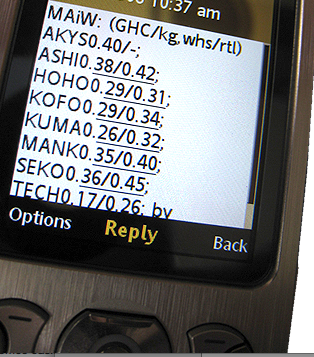Mobile phones access agricultural market price information in developing nations

The most critical piece of information for any farmer is what to grow. What grains are going for good prices at the market. What is overproduced and what is underproduced. What is in demand. Farmers must know this information in order to make a living, hopefully a profit.
Let’s say you’re a farmer in rural part of western Africa. You have very little in the way of communications – the roads are poor, telephone lines are poor or non-existent, internet access is not there. In fact, your village may only contain a few people with literacy to even use the internet. Aside from travelling for hours or days the only way to access market information could be through a shared mobile phone.
Then you need a trust-worthy source of information on the other end. Preferably one that can communicate via SMS text messaging, because it’s much cheaper than making a voice call. I’ve been collecting some information about these kinds of services in Africa and intending to write up what I found for quite a while, so here it is, a summary of the agricultural market information providers operating in Africa that I am aware of.
Esoko
Esoko is the easiest to find on the internet. It was founded by Mark Davies, a serial entrepreneur who started up a number of successful internet companies including CitySearch in the UK before transplanting to Ghana where he founded BusyInternet, an internet café, ICT centre, and business incubator in Accra. In 2005 he started TradeNet which is now renamed to Esoko.
I’ve played around a bit with Esoko and it looks like the real deal. I viewed prices for a variety of produce for a wide variety of markets in Ghana, for example. The data seemed to be fairly up to date. I was able to set up an alert for myself on prices for certain commodities in certain markets, so the system would SMS the prices to me on certain days of the week. You can also 2-way SMS into the system with different code and they will send you back the info you are looking for by return text message.
I couldn’t actually test the SMS because I don’t have an African cell phone # but assuming that works (and I’m sure it does) this looks like a great system with tons of accessible and useful information. They currently have at least some data for Afghanistan, Burkina Faso, Côte d’Ivoire, Cameroon, Mali, Mozambique, Ghana, South Africa, and Sudan so if you’re operating in any of those countries, check it out.
They also seem to be looking to expand their platform as a service into other parts of the world, see: esokonetworks.
Others
Another service is Trade at Hand, which operates in Senegal, Mali and Burkina Faso. I haven’t been able to try this service, but their representative Raphaël Dard tells me via email that they are oriented towards international exporters in those countries, and provide prices in the major agricultural market in Rungis, France. They distribute information via SMS to farmers who sign up at federated agencies within the country.
Hans Hesse tells me on his blog that Zambian National Farmers Union runs a service for that country at http://www.farmprices.co.zm/, unfortunately the site is down as I write. There is some information on the ZNFU site, which appears to be right up to date, and have an SMS interface with short-code 4455 (from inside Zambia). Good stuff.
Last but not least, Engineers Without Borders’s Megan Putnam shared with me a report from an EWB volunteer who examined a project called ECAMIC which facilitated the use of Esoko. One issue they noted was charging the phones in the many locations where no grid power is available. Another is dealing with the metrics for quantity and quality of each commoditiy, which may not be easy to transmit over SMS (some might be weighed, others rated by size and quality).
To summarize. It’s important to be skeptical of any technologically driven development initiative. That said, I’m quite keen on this one because it is based on mobile phones, which are a huge and expanding business concern in Africa, a huge force for development, and probably the continent’s biggest success story right now. They are also durable, cheap, and run on very little power. The information systems I’ve mentioned here are early days, but they seem to work and provide value to their users. I won’t link to testimonials and success stories because I’m too skeptical about them as marketing for development agencies. But reading between the lines there are enough different people trying this out and getting positive results that I would encourage everyone involved to stick with it and keep pushing the boundaries.